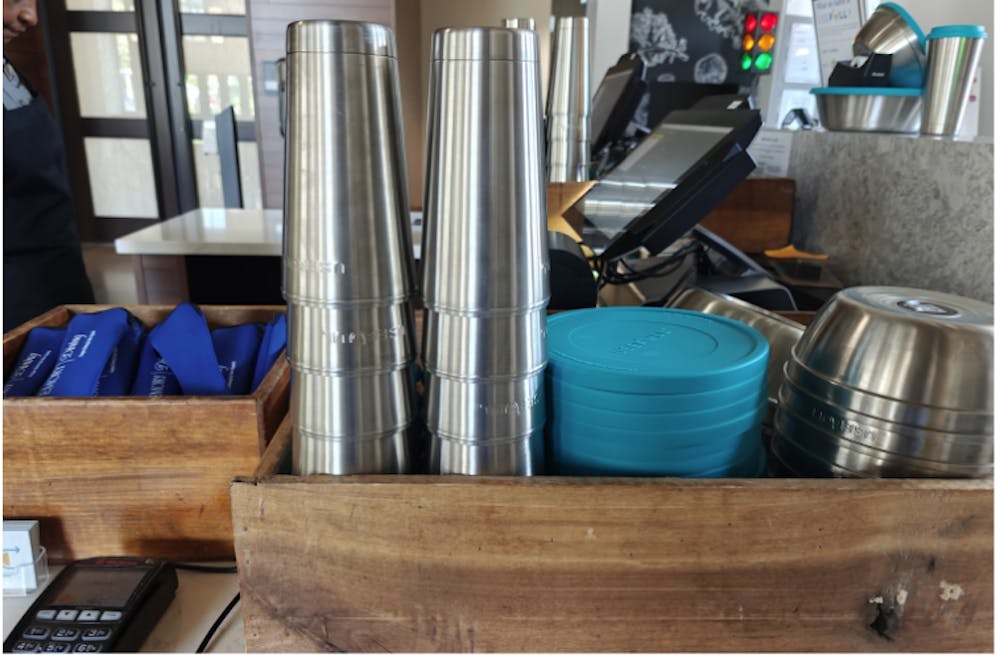Asher Seibel (25Ox) submitted a student petition on Oct. 22 to the Oxford College Student Government Association (OxSGA) to keep a compostable takeout option at Oxford’s residential dining hall, also referred to as Lil’s. The dining hall switched from compostable takeout containers to reusable metal ones on Oct. 8, with the compostable to-go boxes only available during the transition period.
According to guidelines outlined in an OxSGA Instagram post, OxSGA will receive a petition if it amasses at least 10% of the Oxford student body’s signatures. If two-thirds of the student body supports the referendum, OxSGA will “formally support the subject of the petition.”
Oxford’s shift to metal containers comes after Emory University’s Atlanta campus switched to reusable to-go containers last semester. To rent and return containers, users must download the USEFULL app, which offers “plastic-free takeout options” and requires users to scan a barcode on the dishware they wish to use.
Seibel wrote in an email on Oct. 7 to Oxford Dining, Emory Dining, the Emory Office of Sustainability Initiatives, Oxford Dean Badia Ahad and OxSGA that the new take-out box system was “inconvenient” and “a terrible waste of school funds.”
“EVERY SINGLE STUDENT I KNOW IN ATLANTA DISLIKES THE METAL TAKEOUT BOX SYSTEM,” Seibel wrote in the email. “Please do not bring this to Oxford!!”
Seibel added that the new system is especially inconvenient because he believes the purpose of a to-go box is to save time.
“So many people have now stopped going to the dining hall when they’re in a rush and instead gone off campus to get their food,” Seibel said.
Initial communication, which included signs posted in front of the dining hall, made it seem as if the metal containers would immediately replace the old compostable to-go boxes. However, Auxiliary Services at Oxford Julie Elion later clarified this in an EaglePost on Oct. 17.
“Unfortunately, due to various unforeseen circumstances, we were unable to launch this new initiative with the level of communication and planning you typically expect from us,” Elion wrote. “We apologize for the unexpected nature of this change and the inconvenience it caused to students, faculty, and staff.”
Elion wrote in a follow-up email to The Emory Wheel that Oxford Dining did not intend for the misunderstanding.
“We always intended to launch USEFULL and have the old containers available while we transitioned to the new system,” Elion wrote. “We just missed the mark communicating this intent.”
After Elion informed students that both paper and metal takeout containers would be available for the transition period, Seibel wrote in an email to the Wheel that he was “ecstatic.”
Some students, including Asher Schuleman (25Ox), said that although the metal takeout containers were better for the environment, the updated notice in the EaglePost made it seem like Oxford Dining was backtracking.
“They went back on it,” Schuleman said. “I don’t know why.”
Daniel Majzoub (26Ox) said he thought the general student body was unhappy with the change. Another student, Grace Hetrick (25Ox), noted that communication from Oxford was inadequate.
“It just appeared, and then suddenly we were adapting this new system, and there was no input from students,” Hetrick said.
Oxford Dining made this change as a part of Emory’s sustainability initiatives and aims to make Oxford a more eco-friendly campus, according to Elion. She wrote in the Oct. 17 EaglePost that the new containers would support Emory’s zero-waste goal, which aims to “divert 95% of non-construction campus waste from municipal landfills” by 2025.
Oxford Food Recovery Network President Ameer Alnasser (25Ox) said the change will bring environmental improvements to campus. He added that he is “excited” about the change.
Similarly, Majzoub appreciated the effort to make Emory a more sustainable campus but wished that Oxford presented other alternatives.
“It’s great that we’re trying a more environmental approach, but we should still have access to the compostable ones, which worked, and students seem to have preferred,” Majzoub said.






